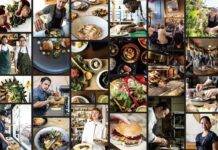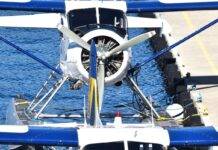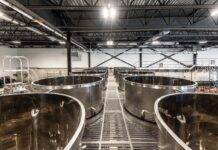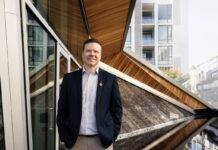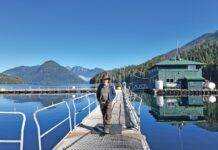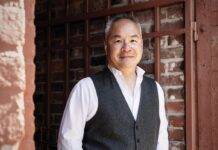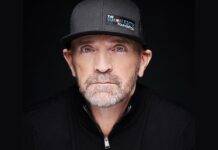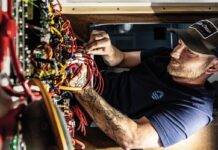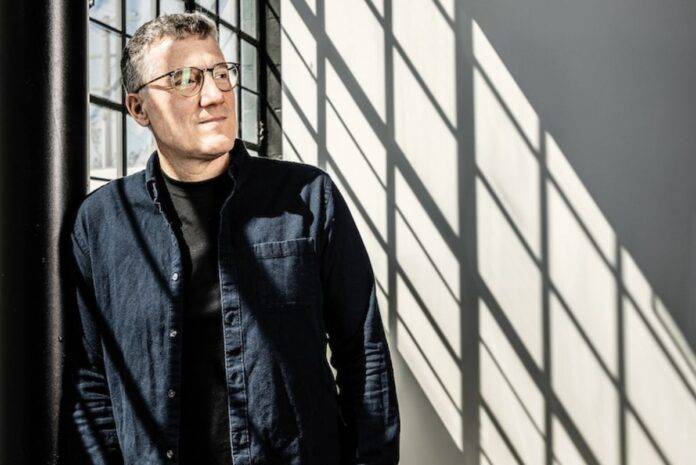The Rifflandia Festival Nick Blasko began with his wife Casey Austin in 2008 makes its 15th appearance this September 11 to 14, again on the Matullia Lands in Rock Bay and featuring an extra day of big-name talent and big-time fun.
The 50-year-old father of three, who has spent a lifetime producing thousands of concerts and major festivals, has expanded his business, while downsizing his, uh … portfolio.
Blasko no longer runs Atomique Productions. The concert-booking firm he started with childhood pal Dimitri Demers was sold to Vancouver’s MRG Group, as was his stake in the Capital Ballroom. He’s also divested himself of music biz clients he used to manage with his agency Amelia Artists. Instead, Blasko is dabbling in Hollywood as an executive producer (Oscar-winner The Brutalist) and, under the banner of the Rifflandia Entertainment Company, is producing festivals, galas and sports events internationally.
The company employs a staff of 12 and, when Rifflandia is rolling, hosts up to 300 volunteers and contributes to more than 350 jobs. “I believe you can run a globally relevant entertainment company from Vancouver Island,” Blasko says. “A lot of people tell me, ‘You’re joking. There’s no way that’s possible.’ But I know it’s possible, yet the destination remains sort of undefined. But we’re doing it.” Renowned for his endless patience and ability to hear what’s being said, Blasko is, I once wrote, “A good guy in a cutthroat world.”
“I like that,” he says.
Douglas: Festival production costs have skyrocketed since the pandemic. How vital is provincial support, like B.C.’s new Destination Events Program?
Nick Blasko: It’s vital for a lot of people for the very survival of their event. For us, not getting it would mean doing a different event and making some difficult decisions. I don’t think we’re in a year where our survival is dependent on it, but certainly in the long-term health of our organization, that would play a factor. If we didn’t have that funding, the cost of tickets would go up significantly or we’d have to drop certain elements of our programming.
Douglas: How much are people willing to spend on a ticket these days?
Nick Blasko: This is the question. For the longest time when we moved to Royal Athletic Park we were charging about $150 for a three-day pass, so about $50 a day. We’re hard pressed to get under $100 a day now or $125. It’s not like prices [for producing a festival] were sky high and then came down. They’ve just continued to go up. What hasn’t gone up is the public’s tolerance for ticket pricing. We can’t just overnight up our ticket prices by 20 or 30 per cent.
Douglas: What does it cost to put on Rifflandia?
Nick Blasko: It’s really expensive. In the early days, we put on the festival for, give or take, a million dollars. In this current iteration, it’s closer to three or four [million]. There’s a wide range there because we’ve reinvented the festival for the past three years in a row.
Douglas: Tell me about your magical power of persuasion that fuels the festival and other events you’ve run, like the super-popular Car-Free Day.
Nick Blasko: I like hearing you say that, but I think it’s more determination and also attracting like-minded people that believe things are possible. Some of the greatest things we’ve done have started with a simple conversation where someone has raised their hand and asked, “Hey, have you thought of this and can I help you with this?” Our answer is, more often than not, “No, we haven’t thought of that and yes, do you want to help with that?”
Douglas: Is there a way to gauge the economic impact Rifflandia has had on Victoria?
Nick Blasko: The cab drivers would say, “We love Rifflandia. It’s like New Year’s Eve three nights in a row for us.” That, to me, was an indicator we were actually putting some dollars and cents back into the city. [A 2015 study showed the fest produced a $3.9-million boost to the city.]
Douglas: Does the festival support local businesses?
Nick Blasko: Hundreds, really. When you break it down, we look at our food vendors, we look at our liquor suppliers, we look at our infrastructure suppliers from sound and lighting to the fencing, to the port-a-potties, to where we print our promotional supplies, to where we buy our insurance to everything. We’ve tried to source local first since the beginning of this festival.
Douglas: Has Rifflandia helped shape policy at City Hall?
Nick Blasko: When I look at our journey we had to jump through so many hoops to get our liquor licences. We were on the forefront of trying to modernize and change those laws to be closer to what we were experiencing in other countries or states or provinces.
Douglas: Rifflandia has a killer brand. How important is that?
Nick Blasko: The festival has a great brand, but that’s hard-earned. We’re doing our 15th festival in 18 years and prior to that was decades of concert promoting to get to that point where we could even do a festival. In many ways, Rifflandia encapsulates my life’s work to an extent.
Douglas: You were the co-chair of the Juno Awards in Vancouver this year and in 2018 as well. You’ve long supported trying to bring the Junos to Victoria. What do we need to make that happen?
Nick Blasko: I don’t think Victoria needs anything. We have it all. I think what needs to happen is CARAS, the Canadian Academy of Recording Arts and Sciences, needs to reimagine their event to fit within what we have. I don’t think we’re very far off from what they need, but this is not a case of Victoria being deficient in any way … we deserve to have the event. It’s a complicated question about whether the Junos travels or not.
Douglas: Does a music festival drive culture in a city?
Nick Blasko: Music is just a massive, very emotional part of people’s lives, whether we’re cognizant of that emotional value or not. We all hear it and experience it differently. Festivals are about enjoying a moment in time and creating some memories and escaping your day-to-day reality.
Douglas: So when it comes down to it, are you only as good as your last Rifflandia?
Nick Blasko: Kind of. Yeah … All I know is that music kind of drives it. That connection people have with songs. Less about artists, I find. But songs are so important in people’s lives.

